
Thomas Stearns Eliot was a poet, essayist, publisher, playwright, literary critic and editor. He is considered to be one of the 20th century's greatest poets, as well as a central figure in English-language Modernist poetry. His use of language, writing style, and verse structure reinvigorated English poetry. He is also noted for his critical essays, which often reevaluated long-held cultural beliefs.
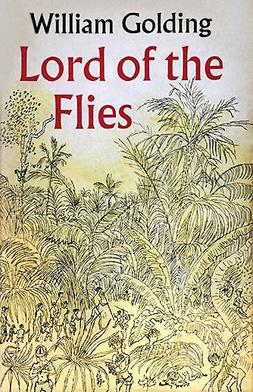
Lord of the Flies is a 1954 novel by the Nobel laureate British author William Golding. The plot concerns a group of British boys who are stranded on an uninhabited island and their disastrous attempts to govern themselves. Themes include the tension between groupthink and individuality, rational and emotional reactions, and morality and immorality.

Sir William Gerald Golding was a British novelist, playwright, and poet. Best known for his debut novel Lord of the Flies (1954), he published another twelve volumes of fiction in his lifetime. In 1980, he was awarded the Booker Prize for Rites of Passage, the first novel in what became his sea trilogy, To the Ends of the Earth. He was awarded the 1983 Nobel Prize in Literature.
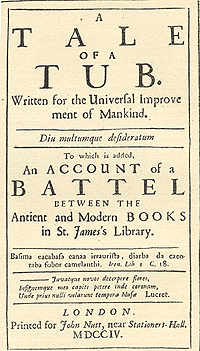
"The Battle of the Books" is a short satire written by Jonathan Swift and published as part of the prolegomena to his A Tale of a Tub in 1704. It depicts a literal battle between books in the King's Library, as ideas and authors struggle for supremacy. Because of the satire, "The Battle of the Books" has become a term for the Quarrel of the Ancients and the Moderns. It is one of his earliest well-known works.

Faber and Faber Limited, usually abbreviated to Faber, is an independent publishing house in London. Published authors and poets include T. S. Eliot, W. H. Auden, Margaret Storey, William Golding, Samuel Beckett, Philip Larkin, Ted Hughes, Seamus Heaney, Paul Muldoon, Milan Kundera and Kazuo Ishiguro.
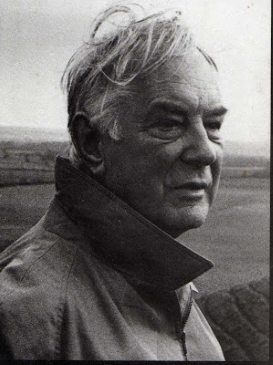
Geoffrey Edward Harvey Grigson was a British poet, writer, editor, critic, exhibition curator, anthologist and naturalist. In the 1930s he was editor of the influential magazine New Verse, and went on to produce 13 collections of his own poetry, as well as compiling numerous anthologies, among many published works on subjects including art, travel and the countryside. Grigson exhibited in the London International Surrealist Exhibition at New Burlington Galleries in 1936, and in 1946 co-founded the Institute of Contemporary Arts. Grigson's autobiography The Crest on the Silver was published in 1950. At various times he was involved in teaching, journalism and broadcasting. Fiercely combative, he made many literary enemies.

The Barrack-Room Ballads are a series of songs and poems by Rudyard Kipling, dealing with the late-Victorian British Army and mostly written in a vernacular dialect. The series contains some of Kipling's best-known works, including the poems "Gunga Din", "Tommy", "Mandalay", and "Danny Deever", helping consolidate his early fame as a poet.

John Carey, is a British literary critic, and post-retirement (2002) emeritus Merton Professor of English Literature at the University of Oxford. He is known for his anti-elitist views on high culture, as expounded in several books. He has twice chaired the Booker Prize committee, in 1982 and 2003, and chaired the judging panel for the first Man Booker International Prize in 2005.

The Monkey and the Cat is best known as a fable adapted by Jean de La Fontaine under the title Le Singe et le Chat that appeared in the second collection of his Fables in 1679 (IX.17). Although there is no evidence that the story existed before the 15th century, it began to appear in collections of Aesop's Fables from the 17th century but is not included in the Perry Index.

The Inheritors is a work of prehistoric fiction and the second novel by the British author William Golding, best known for his first novel, Lord of the Flies (1954). It concerns the extinction of one of the last remaining tribes of Neanderthals at the hands of the more sophisticated Homo sapiens. It was published by Faber and Faber in 1955.

"Before the Law" is a parable contained in the novel The Trial, by Franz Kafka. "Before the Law" was published twice in Kafka's lifetime, first in the 1915 New Year's edition of the independent Jewish weekly Selbstwehr, then in 1919 as part of the collection Ein Landarzt. The Trial, however, was not published until 1925, after Kafka's death.

Lord of the Flies is a 1963 British drama film based on William Golding's 1954 novel of the same name about 30 schoolboys who are marooned on an island where the behaviour of the majority degenerates into savagery. It was written and directed by Peter Brook and produced by Lewis M. Allen. The film was in production for much of 1961, though the film did not premiere until 1963, and was not released in the United Kingdom until 1964. Golding himself supported the film. When Kenneth Tynan was a script editor for Ealing Studios he commissioned a script of Lord of the Flies from Nigel Kneale, but Ealing Studios closed in 1959 before it could be produced.

The Book of General Ignorance is the first in a series of books based on the final round in the intellectual British panel game QI, written by series-creator John Lloyd and head-researcher John Mitchinson, to help spread the QI philosophy of curiosity to the reading public. It is a trivia book, aiming to address and address many of the misconceptions, mistakes and misunderstandings in 'common knowledge'—it is therefore known not as a 'General Knowledge' book, but as 'General Ignorance'.

The Scorpion God is a collection of three novellas by William Golding published in 1971. They are all set in the distant past: "The Scorpion God" in ancient Egypt, "Clonk Clonk" in pre-historic Africa, and "Envoy Extraordinary" in ancient Rome. A draft of "The Scorpion God" had been written but abandoned in 1964, "Clonk Clonk" was newly written for the book, and "Envoy Extraordinary" had been published before, in 1956. "Envoy Extraordinary" became a play called The Brass Butterfly which was performed first in Oxford and later in London and New York.

The Ralph Waldo Emerson House is a house museum located at 18 Cambridge Turnpike, Concord, Massachusetts, and a National Historic Landmark for its associations with American philosopher Ralph Waldo Emerson. He and his family named the home Bush. The museum is open mid-April to mid-October; an admission fee is charged.
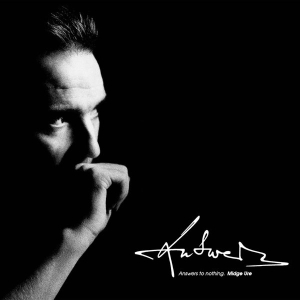
Answers to Nothing is the second solo studio album by Scottish musician Midge Ure, released in August 1988 by Chrysalis Records. It was the first release by Ure following the demise of Ultravox.

The Fox and the Cat is an ancient fable, with both Eastern and Western analogues involving different animals, that addresses the difference between resourceful expediency and a master stratagem. Included in collections of Aesop's fables since the start of printing in Europe, it is number 605 in the Perry Index. In the basic story a cat and a fox discuss how many tricks and dodges they have. The fox boasts that he has many; the cat confesses to having only one. When hunters arrive with their dogs, the cat climbs a tree, but the fox thinks of many ways without acting and is caught by the hounds. Many morals have been drawn from the fable's presentations through history and, as Isaiah Berlin's use of it in his essay "The Hedgehog and the Fox" shows, it continues to be interpreted anew.
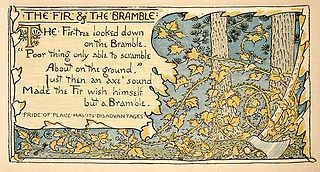
The Fir and the Bramble is one of Aesop's Fables and is numbered 304 in the Perry Index. It is one of a group in which trees and plants debate together, which also includes The Trees and the Bramble and The Oak and the Reed. The contenders in this fable first appear in a Sumerian debate poem of some 250 lines dating from about 2100 BCE, in a genre that was ultimately to spread through the Near East.

An Englishman Looks at the World is a 1914 essay collection by H. G. Wells containing journalistic pieces written between 1909 and 1914. The book consists of twenty-six pieces ranging from five to sixty-two pages in length. An American edition was published the same year by Harper and Brothers under the title Social Forces in England and America.

Finders Keepers: Selected Prose 1971–2001 is a 2001 collection of prose by Seamus Heaney, published by Faber and Faber. It features reprints from earlier Heaney collections, and several works previously published in newspapers, as lectures, or contributions to books.




















